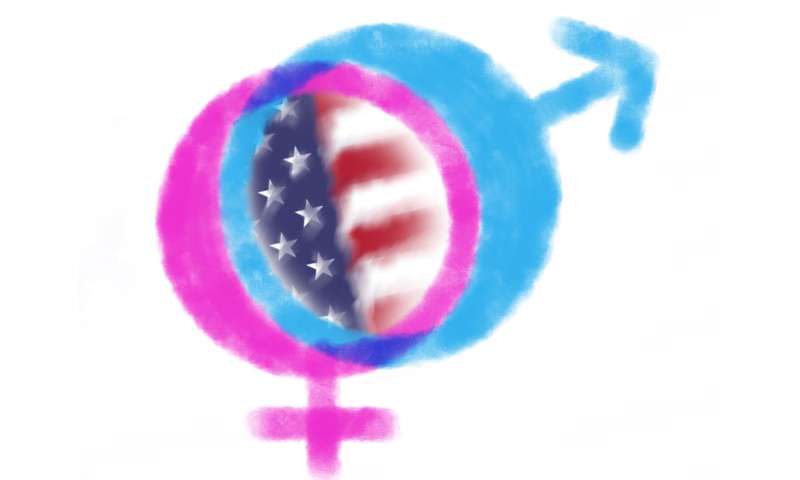Conservative teens are more likely to internalize gender stereotypes when judging moral violations

Morality is a complex human phenomenon, but predicting an adult's position on moral issues is relatively easy if we know a few simple things about them, e.g., age, religion, political identity. For example, in the United States, we can predict to a high degree of accuracy where a person stands on abortion rights, gun control and environmental policy just by knowing their political party affiliation. In more generalizable terms, we know through empirical research that liberals tend to emphasize ideals of care and justice when making moral judgments, but conservatives tend to emphasize loyalty, respect and sanctity. There are also predictable differences between men and women. For example, women are more likely to show greater concern toward moral violations involving physical and emotional harm whereas men are more likely to show greater concern for disloyalty and disrespect.
We know political differences in moral judgments are the product of sociocultural experience, but to what degree gender differences are the result of biology, e.g., moderated by sex hormones, and to what degree gender differences are the result of experience is a perennial question for psychologists. Research on people in the process of forming their gender and political identities (e.g., adolescents) can provide some insight into how these identities interact and help us explain some of the variation and predictability we see in moral judgments.
To explore this topic, I administered a survey to 1,720 adolescents ages 11 to 18 years old (average age about 14 years old) from highly conservative counties in the Midwest United States in which they rated various moral violations on degree of wrongness. The moral violations were divided into categories including physical harm to animals, physical harm to humans, emotional harm, injustice, offense against personal autonomy, disloyalty, disrespect for authority, and irreverence for sanctity or cleanliness. To give a couple examples, an emotional harm violation would be something like "You see a girl saying that another girl is not pretty enough to be a varsity cheerleader." And a disrespect for authority violation would be something like "You see a star player ignoring his coach's order to come to the bench during a game."
As expected, most teens surveyed didn't identify with a political party or ideology, and those non-identifying teens still skewed conservative in how they rated the moral violations; e.g., giving generally lower ratings in physical harm violations and higher ratings in disloyalty and disrespect violations—after all, they are growing up in highly conservative communities and being raised, for the most part, in highly conservative homes.
When I looked at the ratings of teens who did identify with a political identity, I found little difference in those who actually identified as conservative. However, teens who indicated a liberal political identity showed a statistically significant increase in their ratings of the wrongness of offenses against personal autonomy and a decrease in ratings of disrespect for authority, disloyalty and irreverence—all of which are consistent with liberal adults.
Things got interesting, though, when I considered the influence of gender and the possibility of gender by political identity interaction effects. In short, I found gender by conservative identity interaction effects in physical harm to animals, physical harm to humans, emotional harm, injustice, and irreverence violations (with the greatest decreases in these ratings for conservative boys). However, I found no interaction effects between gender and liberal political identity for any of the violations, and no variance was explained by gender for teens who indicated a liberal identity. This suggests that teens who identify politically as conservative are more likely to internalize gender stereotypes that in turn influence how they rate moral violations. Or in other words, teens in a highly conservative social context who identify as liberal are in a sense "guarded" against internalizing the gender stereotypes that are internalized by their conservative identifying and non-identifying peers.
There are still a lot of questions to be answered, but these findings shed light on the influence gender and political identity development can have in forming one's sense of right and wrong. It suggests that in certain contexts, the internalization of gender stereotypes might be moderated by political beliefs, and, on an even more fundamental level, it suggests that teens are able to recognize meaning behind political identity and internalize ideological beliefs that in turn impact their moral judgments in ways that are consistent with adults. Finally, it suggests that late childhood and early adolescence might not be too early to encourage youth to engage with higher-level social and political ideas and civic engagement. Such developmental experiences might have long-term impacts on their sense of identity and therefore their sense of right and wrong as adults.
This story is part of Science X Dialog, where researchers can report findings from their published research articles. Visit this page for information about ScienceX Dialog and how to participate.
More information:
Brandon L. Bretl, Adolescent Ratings of Moral Violations Moderated by Gender and Political Identity, Trends in Psychology (2022). DOI: 10.1007/s43076-021-00120-z
Brandon L. Bretl is an assistant professor in the Department of Education and Psychology at the University of Texas at Tyler. His research is focused on social, cultural, and psychological factors related to science education and beliefs about science. He teaches classes in psychology, science education, and program evaluation. His most recent projects are focused on outreach programs for gifted and talented youth in rural settings to provide more efficient pathways to high-level careers in STEM, research, and medicine.